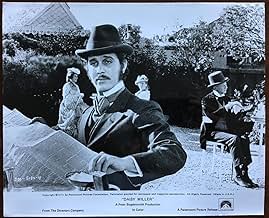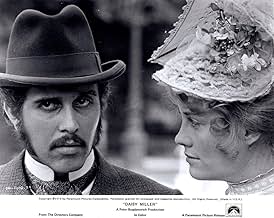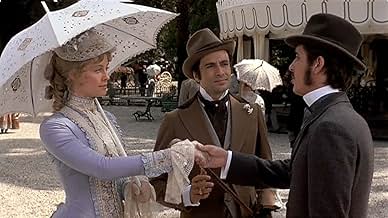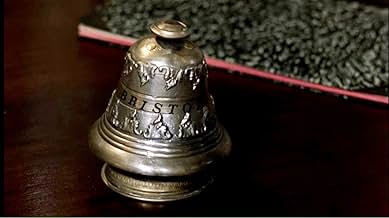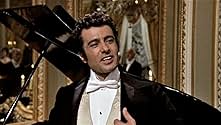IMDb RATING
6.2/10
2.2K
YOUR RATING
In this comedy of manners, Frederick Winterbourne tries to figure out the bright and bubbly Daisy Miller, only to be helped and hindered by false judgments from their fellow friends.In this comedy of manners, Frederick Winterbourne tries to figure out the bright and bubbly Daisy Miller, only to be helped and hindered by false judgments from their fellow friends.In this comedy of manners, Frederick Winterbourne tries to figure out the bright and bubbly Daisy Miller, only to be helped and hindered by false judgments from their fellow friends.
- Director
- Writers
- Stars
- Nominated for 1 Oscar
- 1 win & 1 nomination total
- Director
- Writers
- All cast & crew
- Production, box office & more at IMDbPro
Featured reviews
Excellent adaptation of the Henry James story about a willful girl in Europe and the price she pays.
Peter Bogdanovich does an excellent job in recreating the long-ago world when Americans of means made "the grand tour" and saw everything there was to see in Europe. The leisurely world of the moneyed classes before World War I is beautifully realized here with breathtaking scenery, sets, and costumes. Just perfect.
This film has been unjustly maligned for more than 30 years and needs to be re-assessed. The cast is just about perfect.
Cybill Shepherd is the perfect Daisy. A naive girl from Schenectady who talks nonstop and flirts with all the men. The old women among the expatriate set think she's wicked, not very innocent, etc. But the callow American-born Winterbourne (Barry Brown) who has been educated in Geneva falls for her simple ways and beauty. Is she a mantrap? Or is she just what she seems to be.... a slightly silly girl who is a little too headstrong? Shepherd chatters and flirts to perfection, leaving Brown a flustered and confused suitor. Cloris Leachman is the ditzy mother. Mildred Natwick is the world-weary aunt. Eileen Brennan is the catty widow. Duilio del Prete is the "little Roman." Several scenes are standouts: Shepherd singing "Maggie" is a highlight. She sings nicely and is beautifully framed in a large window. The "spa" scene with Natwick and Brown is hilarious as the various "bathers" loll about in the hot-spring pool with various items floating about on inflated pillows. The aunt and nephew are taking tea while two old men play chess.... A vase with flowers drifts by... Oh so languid and leisurely an age. Og course being a Henry James story, poor Daisy does get her comeuppance.
The film is a total treat, filled with good acting and humor and those gorgeous views of Vevey, Switzerland.
Peter Bogdanovich does an excellent job in recreating the long-ago world when Americans of means made "the grand tour" and saw everything there was to see in Europe. The leisurely world of the moneyed classes before World War I is beautifully realized here with breathtaking scenery, sets, and costumes. Just perfect.
This film has been unjustly maligned for more than 30 years and needs to be re-assessed. The cast is just about perfect.
Cybill Shepherd is the perfect Daisy. A naive girl from Schenectady who talks nonstop and flirts with all the men. The old women among the expatriate set think she's wicked, not very innocent, etc. But the callow American-born Winterbourne (Barry Brown) who has been educated in Geneva falls for her simple ways and beauty. Is she a mantrap? Or is she just what she seems to be.... a slightly silly girl who is a little too headstrong? Shepherd chatters and flirts to perfection, leaving Brown a flustered and confused suitor. Cloris Leachman is the ditzy mother. Mildred Natwick is the world-weary aunt. Eileen Brennan is the catty widow. Duilio del Prete is the "little Roman." Several scenes are standouts: Shepherd singing "Maggie" is a highlight. She sings nicely and is beautifully framed in a large window. The "spa" scene with Natwick and Brown is hilarious as the various "bathers" loll about in the hot-spring pool with various items floating about on inflated pillows. The aunt and nephew are taking tea while two old men play chess.... A vase with flowers drifts by... Oh so languid and leisurely an age. Og course being a Henry James story, poor Daisy does get her comeuppance.
The film is a total treat, filled with good acting and humor and those gorgeous views of Vevey, Switzerland.
Many reviewers here seem to have confused the story and characters with the film and the actors.
Yes, Daisy in the film is rather flat and monotonous. But that's a high compliment -- that the ravishing Cybill Shepherd could so accurately portray such a flat character. Henry James at one point describes Daisy's expression as a "light, slightly monotonous smile", in another her voice as a "little soft, flat monotone". He says late in the story that "there was always, in her conversation, the same odd mixture of audacity and puerility". No, she wouldn't be a very pleasant person to be around for long. But that was part of James's point: that our attraction to people (especially those of the opposite sex) often defies reason. Shepard makes the point well.
Some have commented that they wished the story had been filled out. Some of those apparently haven't read the story. One of those critics even places the story wrong by forty years. Though called a novella, it's barely more than a short story. In fact the film does a remarkable job of portraying the events and (more importantly) the characters very much as they are in the story. The great majority of the dialog in the film is verbatim from the story.
In some instances, the scenes and characters were significantly expanded from the James story. How far should a director go, if the aim is to film a classic story, not just to make something derived from that story? James's characters were pretty flat, a lot flatter than those in the film. One could justifiably criticize the film for telling the story far better than James did.
Do you think James's story is dated and flat in the modern world? Well, in many ways so do I. A polemical assault on discrimination based on manners and birth is truly dated. Yet an assault on personal discrimination remains fully current. The modern world is certainly not devoid of personal discrimination. Perhaps it's not often so ugly, not in the first world anyway, but prejudice is very much alive.
James's story is also unsubtle: two groups of people with differing views, one person caught with one foot in each camp, unhappy results. That's about it. Should one film the classic story, or build something different? It's a choice; great films have been made both ways. The choice for this film was unambiguous: to film the classic story.
The photography is truly gorgeous -- the film (at least the outdoor parts) was shot on location in Vevey, Switzerland and Rome, Italy. Despite the long stretches of dialog, including Daisy's run-on commentaries, one need not strain to understand the words. If the story were as good as the production and acting (several good performances) then this would be a 10. The faithfulness to the original weights it down.
Yes, Daisy in the film is rather flat and monotonous. But that's a high compliment -- that the ravishing Cybill Shepherd could so accurately portray such a flat character. Henry James at one point describes Daisy's expression as a "light, slightly monotonous smile", in another her voice as a "little soft, flat monotone". He says late in the story that "there was always, in her conversation, the same odd mixture of audacity and puerility". No, she wouldn't be a very pleasant person to be around for long. But that was part of James's point: that our attraction to people (especially those of the opposite sex) often defies reason. Shepard makes the point well.
Some have commented that they wished the story had been filled out. Some of those apparently haven't read the story. One of those critics even places the story wrong by forty years. Though called a novella, it's barely more than a short story. In fact the film does a remarkable job of portraying the events and (more importantly) the characters very much as they are in the story. The great majority of the dialog in the film is verbatim from the story.
In some instances, the scenes and characters were significantly expanded from the James story. How far should a director go, if the aim is to film a classic story, not just to make something derived from that story? James's characters were pretty flat, a lot flatter than those in the film. One could justifiably criticize the film for telling the story far better than James did.
Do you think James's story is dated and flat in the modern world? Well, in many ways so do I. A polemical assault on discrimination based on manners and birth is truly dated. Yet an assault on personal discrimination remains fully current. The modern world is certainly not devoid of personal discrimination. Perhaps it's not often so ugly, not in the first world anyway, but prejudice is very much alive.
James's story is also unsubtle: two groups of people with differing views, one person caught with one foot in each camp, unhappy results. That's about it. Should one film the classic story, or build something different? It's a choice; great films have been made both ways. The choice for this film was unambiguous: to film the classic story.
The photography is truly gorgeous -- the film (at least the outdoor parts) was shot on location in Vevey, Switzerland and Rome, Italy. Despite the long stretches of dialog, including Daisy's run-on commentaries, one need not strain to understand the words. If the story were as good as the production and acting (several good performances) then this would be a 10. The faithfulness to the original weights it down.
Don't let the first 10 minutes fool you, this movie is tremendous. Shepherd might seem off putting at the start, but she fully takes hold of the character and Brown's sad eyes do more to sell the story than anything. Sure it's set in a bygone age, but the feelings are totally universal and the ending is just devastating. This is totally unfairly passed over and deserves more attention. It's every bit as good as Barry Lyndon, just in a different way.
For his first film un color Peter Bodanovich chose a most curious and arcane subject, 19th century novel by Henry James. Daisy Miller on screen is an Americaniized version of onr of those films that the Merchant-Ivory team do
so well with for British subjects.
Our title role is played by Cybill Shepherd and Daisy is a rather ingenuous girl traveling with her mother Cloris Leachman and much younger brother James McMurtry. They're over from, Schenectady where the father made big money and employed a lot of the town.
The Millers are the subject of much gossip by other expatriate Americans like Mildred Natwick and Eileen Brennan. Mainly because they don't know the ropes and Daisy scandalizes them by going out unescorted and with European men who are after American virtue and money.
Barry Brown is Natwick's nephew and an expatriate student. He's the only one who finds Shepherd intriguing, but won't break convention.
Shot on location in Switzerland and Rome the film really captures the look and feel of 19th century Europe. Daisy Miller got an Oscar nomination for costume design. It's beaitifully crafted and sad that the film did not do so well at the box office.
I guess Henry James was out of season.
Our title role is played by Cybill Shepherd and Daisy is a rather ingenuous girl traveling with her mother Cloris Leachman and much younger brother James McMurtry. They're over from, Schenectady where the father made big money and employed a lot of the town.
The Millers are the subject of much gossip by other expatriate Americans like Mildred Natwick and Eileen Brennan. Mainly because they don't know the ropes and Daisy scandalizes them by going out unescorted and with European men who are after American virtue and money.
Barry Brown is Natwick's nephew and an expatriate student. He's the only one who finds Shepherd intriguing, but won't break convention.
Shot on location in Switzerland and Rome the film really captures the look and feel of 19th century Europe. Daisy Miller got an Oscar nomination for costume design. It's beaitifully crafted and sad that the film did not do so well at the box office.
I guess Henry James was out of season.
Based on Henry's James novella, Peter Bogdanovich brings us a period dramedy about American high society in Europe of the 19th century. Daisy (Cybill Shepherd) is a strong willed young heiress, a woman out of her time who isn't afraid to tease and flaunt authority figures as well as men, much to the chagrin of 'polite' society. Fresh faced yuppie Frederick Winterbourne (Barry Brown) tries to wrap his head around this unusual young woman as they tour around the beauty of Italy and France.
While it may be dramatically lacking, there's something breezy, cheeky and appealing about Bogdanovich's once maligned film, much like its title character. Off the bat, the production values are stellar: it's sumptuously photographed with excellent period detail as we go around the sun drenched country and old cities of South Europe. Also, Bogdanovich doesn't shy from long takes, allowing actors to build up a lot of chemistry and back and forth between them as they banter about society and the landscape, which of course, masks their real intent. James' writing, adapted by Frederic Raphael, is laced with subtext while being rather amusing, especially by the usually stuffy nature of period pieces.
Now, one thing made fun of back during the original release was Shepherd's performance, seen as too ditsy and airy, but I disagree. Shepherd's skills as a comic actress allow her to be somewhere between cunning and insolent, as befitting such a character, and she works well with the far more straight, traditionalist Brown as Winterbourne. Supporting them capably are the likes of Cloris Leachman as Daisy's dotty mother, Mildred Natwick as Daisy's stern aunt and especially Eileen Brennan as the prim, snobby socialite Mrs Walker who serves an ideological counterpoint to Daisy and does it superbly.
What ultimately does hold back 'Daisy Miller' is, ironically, the material itself: it isn't terribly cinematic, beautiful as the landscape is. James' story is very heavy on dialogue and situation as opposed to action, making it feel more like a stage play in style than a screenplay. 90% of the film is characters just waxing philosophical and discussing gossip and combined with the comic slant, does take down any real dramatic stakes as there's not much to lose for our lead other than 'respect'. Bogdanovich seems to have embraced the cheek of Daisy moreso than any sort of deeper satire of social structures and the pomp of Americans which the story clearly leans towards. That being said, it was still rather enjoyable. Long before the Merchant Ivory years made frills and carriages a must for cinema, a sense of humour and the strong cast make this pleasant, if not particularly demanding, viewing.
While it may be dramatically lacking, there's something breezy, cheeky and appealing about Bogdanovich's once maligned film, much like its title character. Off the bat, the production values are stellar: it's sumptuously photographed with excellent period detail as we go around the sun drenched country and old cities of South Europe. Also, Bogdanovich doesn't shy from long takes, allowing actors to build up a lot of chemistry and back and forth between them as they banter about society and the landscape, which of course, masks their real intent. James' writing, adapted by Frederic Raphael, is laced with subtext while being rather amusing, especially by the usually stuffy nature of period pieces.
Now, one thing made fun of back during the original release was Shepherd's performance, seen as too ditsy and airy, but I disagree. Shepherd's skills as a comic actress allow her to be somewhere between cunning and insolent, as befitting such a character, and she works well with the far more straight, traditionalist Brown as Winterbourne. Supporting them capably are the likes of Cloris Leachman as Daisy's dotty mother, Mildred Natwick as Daisy's stern aunt and especially Eileen Brennan as the prim, snobby socialite Mrs Walker who serves an ideological counterpoint to Daisy and does it superbly.
What ultimately does hold back 'Daisy Miller' is, ironically, the material itself: it isn't terribly cinematic, beautiful as the landscape is. James' story is very heavy on dialogue and situation as opposed to action, making it feel more like a stage play in style than a screenplay. 90% of the film is characters just waxing philosophical and discussing gossip and combined with the comic slant, does take down any real dramatic stakes as there's not much to lose for our lead other than 'respect'. Bogdanovich seems to have embraced the cheek of Daisy moreso than any sort of deeper satire of social structures and the pomp of Americans which the story clearly leans towards. That being said, it was still rather enjoyable. Long before the Merchant Ivory years made frills and carriages a must for cinema, a sense of humour and the strong cast make this pleasant, if not particularly demanding, viewing.
Did you know
- TriviaAccording to Peter Bogdanovich, Hollywood legend Orson Welles said that actress Cybill Shepherd was born to play Daisy Miller, but he didn't want to direct Daisy Miller (1974).
- Quotes
Annie P. 'Daisy' Miller: I'm a terrible, frightful flirt. Did you ever hear of a nice girl that wasn't? But now I guess you'll tell me I'm not a nice girl.
- ConnectionsFeatured in Daisy Miller: An Introduction by Peter Bogdanovich (2003)
- How long is Daisy Miller?Powered by Alexa
Details
Box office
- Budget
- $2,200,000 (estimated)
- Runtime1 hour 31 minutes
- Sound mix
- Aspect ratio
- 1.85 : 1
Contribute to this page
Suggest an edit or add missing content




